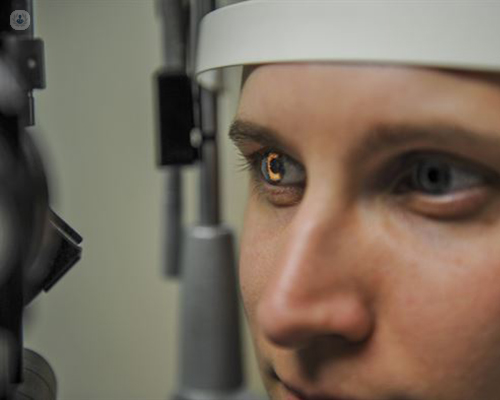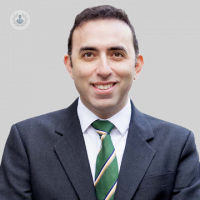What’s the difference between a plastic surgeon and an oculoplastic surgeon?
Written in association with:Mr Daniel Ezra is an expert consultant ophthalmic and oculoplastic surgeon based at the prestigious Moorfields Eye Hospital in London, with particular expertise in functional and aesthetic surgical procedures. Here, Mr Ezra explains the type of work he is able to perform, and why more and more people are considering undergoing surgery through an oculoplastic surgeon these days.
What is an oculoplastic surgeon?
An oculoplastic surgeon is a specialised ophthalmologist (eye doctor) who has chosen to specialise in both eyelid and facial plastic surgery relevant to the eyes. Oculoplastic surgery spans a wide variety of facial surgical procedures, including, but not limited to, the tear ducts, the eyelids, the eye socket, brow, and midface. Oculoplastic specialists are experts in cosmetic and reconstructive surgery of the eyelids. The most common aesthetic procedure performed is blepharoplasty (eye-lift). When considering cosmetic surgery, there was a time when consulting only a plastic surgeon would cross patients’ minds – but now there is growing interest in the treatment and expertise offered by oculoplastic surgeons. What makes them different to a plastic surgeon?
What’s the difference between a plastic surgeon and an oculoplastic surgeon?
Both plastic surgeons and oculoplastic surgeons attend medical school, but the way they later choose to specialise and train makes all the difference in what they offer to patients. After medical school, plastic surgeons spend two years training in general surgery across a variety of specialties. They train in surgery and reconstruction for many different body parts, with many different outcomes and alterations. After foundation training, they will then choose a specialty and spend a further six years in training. Plastic surgery is a competitive specialty and surgeons use their expert skill across a broad range of procedures. Plastic surgeons will typically have almost no exposure to eyelid surgery during their training as most of this is now done by oculoplastic surgeons.
Oculoplastic surgeons, on the other hand, are trained ophthalmologists, meaning they spend a minimum of seven years training in eye surgery and eyelid surgery, later choosing to specialise in oculoplastic surgery of a further extended period of time. An oculoplastic surgeon therefore is trained to manage facial plastic surgery and the surgery on the eyelid, and also the eye itself. This training provides for more finesse and a more precise approach.
Both specialists are skilled in their field, however when it comes to specific surgery concerning the eyelids and certain areas of the face, an oculoplastic surgeon naturally has more specialist knowledge of the eye.
What kind of surgery can an oculoplastic surgeon perform?
Oculoplastic surgeons can perform procedures for both cosmetic and medical reasons. They can perform reconstructive surgery, or rejuvenation surgery, for example. There are many types of procedure performed by an oculoplastic surgeon, involving the eye, the socket, tear ducts, and related structures to the eye such as the brow. Most procedures correct specific eye-related conditions, such as blepharospasm. Some of the most common conditions treated include:
- Ptosis (droopy eyelids)
- Tear duct problems
- Skin cancers or eyelid/eye growths and lesions
- Inward-turning or outward-turning eyelids
- Trauma and injury to the eye
- Cosmetic procedures, such as blepharoplasty, brow lifts, or removal of excess skin
What are the advantages of visiting an oculoplastic surgeon?
An oculoplastic surgeon, whilst trained in surgery, is also trained as an ophthalmologist, and therefore has a thorough knowledge and understanding of the eyes and their surrounding structures. This means that any eye complications can be identified and managed, whereas general plastic surgeons have no training in this area and are unable to examine or assess the eyes.
Oculoplastic surgeons, with their precision and skill, can also correct results from previous cosmetic surgery around the eyes, which may not meet with the patient’s original desired outcome. These types of corrective procedures are highly specialised and require a detailed understanding of how the eye has been affected by adverse surgery.
It is important to remember that the decision to undergo surgery is not one that should be made without serious consideration, and it is always best to consult with a medical professional who is a recognised specialist. The eyes are aesthetically a central feature of the face, and choosing a specialist with the expert knowledge of the eye area and its intricacies can yield a natural look which works in harmony with the rest of your facial features.



